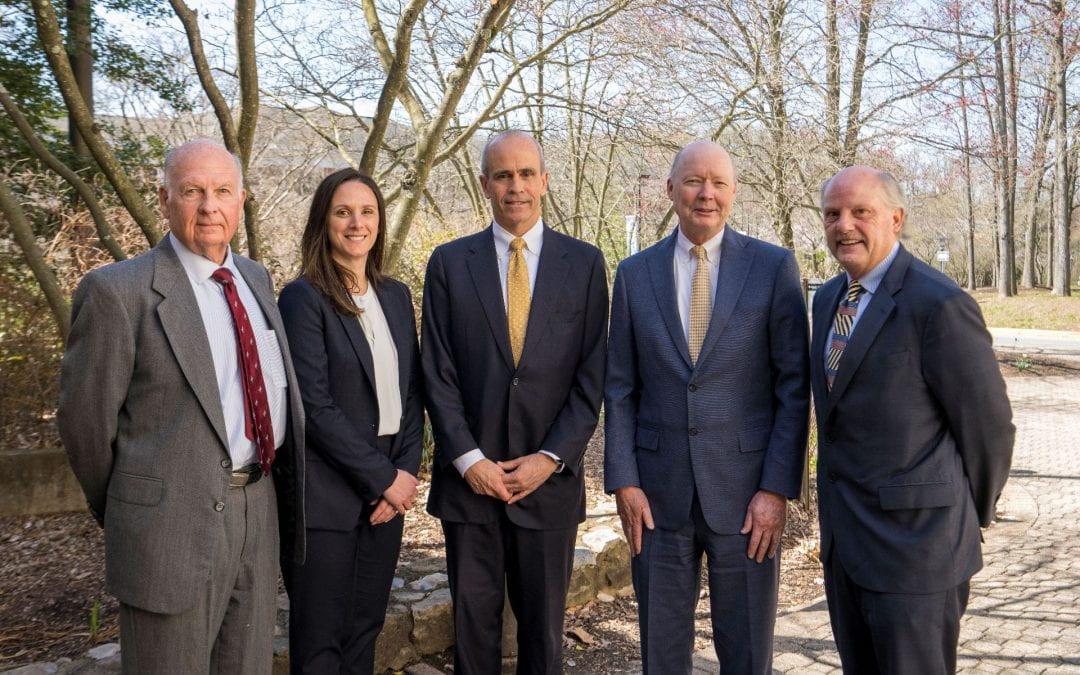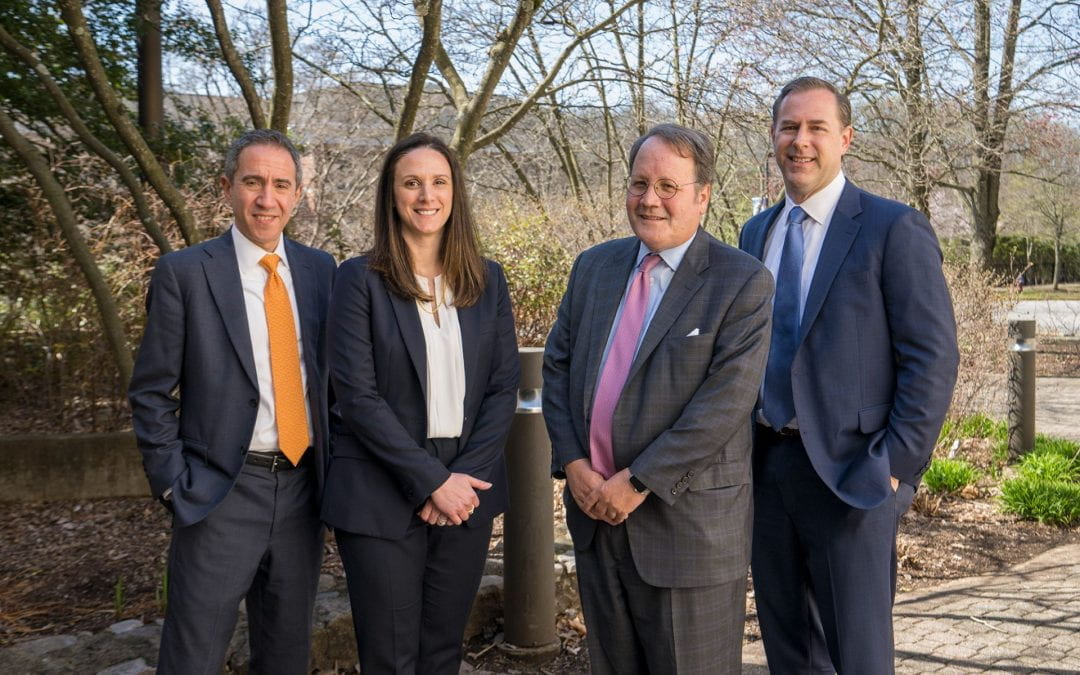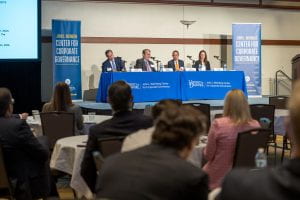


Delaware Law Update
Delaware Law Update
Tuesday, April 4, 2023
Clayton Hall, University of Delaware, Newark, DE
Delaware has seen developments over the past year – and is facing new open questions – in a number of areas of corporate law. The Panel discussed the following:
- The Court of Chancery for the first time applied oversight duties to officers in In re McDonald’s Corp. Stockholder Derivative Litigation, raising a host of questions for corporations and practitioners.
- Following the Court of Chancery’s decision in Garfield v. Boxed, Inc., which arose out of a de-SPAC transaction, the Court has been asked by other post-de-SPAC companies to validate hundreds of millions of shares of stock called into question by Garfield.
- The Court of Chancery set forth a new test for the independence of special committees under the MFW analysis, and that test is currently facing challenge in the Delaware Supreme Court.
- The General Assembly amended Section 102(b)(7) of Delaware’s General Corporation Law to allow exculpatory provisions for corporate officers, and the Court of Chancery is currently hearing challenges to early implementations of those exculpatory provisions.
 The panel participants were:
The panel participants were:
- Corinne E. Amato, Director, Prickett, Jones & Elliott
- Rolin P. Bissell, Partner, Young Conaway Stargatt & Taylor
- Gary A. Bornstein, Partner, Cravath, Swaine & Moore
- Blake Rohrbacher, Director, Richards Layton & Finger (Moderator)
Materials:
- ””In re Lordstown Motors”: Providing Relief Form ‘Untold Chaos”, by Nathaniel J. Stuhlmiller and Daniel S. Barrow, Delaware Business Court Insider, March 1, 2023.
- “Amendments to the DGCL permit Officer Exculpation,” by John mark Zeberkiewicz and Robert B. Greco, Insights, vol. 36, no. 10, October 2022
- “Three Lessons From Three years of Post-‘Marchand’ Caselaw,” by Nathaniel J. Stuhlmiller and Brian T. M. Mammarella, Delaware Business Court Insider, November 16, 2022
- “Delaware Law Update” Bios
2023 Corporate Governance Symposium
PAST EVENT: Friday, March 17, 2023
8:45 am – 4:15 pm EDT / 13:45 pm – 21:15 pm CET
Clayton Hall, University of Delaware, Newark DE
In-person and Live-stream
In collaboration with the European Corporate Governance Institute (ECGI), the John L. Weinberg Center for Corporate Governance and the Department of Finance at the Lerner College of Business and Economics at the University of Delaware hosted its 2023 annual corporate governance symposium. The winners of the 2023 John L. Weinberg/IRRCi $10,000 Research Paper Award competition were announced during the program.
The winning papers are:
- “Female Equity Analysts and Corporate Environmental and Social Performance”
Authors: Kai Li (University of British Columbia), Feng Mai (Stevens Institute of Technology), Gabriel Wong (Cardiff University), Chelsea Yang (University of British Columbia), and Tengfei Zhang (Rutgers University) - “Conflicting Fiduciary Duties and Fire Sales of VC-backed Start-ups”Bo Bian (University of British Columbia), Yingxiang Li (University of British Columbia), and Casimiro A. Nigro (Goethe University)
The papers included in the Symposium collectively addressed new developments and critical issues within the area of corporate governance.
2023 John L. Weinberg/ IRRCi Research Paper Competition: The research paper competition seeks to highlight innovative research and includes an award of US$10,000.
Program Videos:
- “Proxy Exempt Solicitation Campaigns”
- “Conflicting Fiduciary Duties and First Sales of VC-backed Start-Ups”
- “The Perils and Questionable Promise of ESG-based Compensation”
- “Socially Responsible Divestment”
- “Proxy Voting and the Rise of ESG”
- “Female Equity Analysts and Corporate Environmental & Social Performance”
- “Fast and Furious” session
The Evolving ESG Landscape: Practical Advice for Today
Date: February 22, 2023
Time: 2:00 pm – 5:00 pm ET
Location: Clayton Hall
- View Recording – Program First Session
- View Recording – Program Second Session
- Agenda and Scenario
- Reference Materials List
This three-hour interactive event explored, from the board’s perspective, the most challenging issues emerging in the ESG landscape, focusing on the board’s role, as well as emphasizing practical advice for boards and management. The program was led by Sabastian V. Niles, a Partner from Wachtell, Lipton, Rosen & Katz, and John W. White, a Partner from Cravath, Swaine & Moore LLP. Rather than dwelling on the SEC and European proposals in the ESG arena, the discussion drilled down on ESG related issues frequently encountered by boards today. Panel members discussed board / board committee and management responsibilities with respect to ESG, fiduciary duties, integrating ESG into strategy and operations, the importance of reliable data and internal control procedures, ESG metrics and targets related to compensation plans, ESG activists and shareholder proposals. Case studies and scenarios were utilized to illustrate some of the complexities and challenges.
In addition to Sabastian Niles and John White, the other participants were:
• Michael L. Arnold, Partner, Cravath, Swaine & Moore LLP
• Catherine G. Dearlove, Director, Richards, Layton & Finger
• Aaron Holmes, General Counsel North America & Senior Managing Director, Accenture
• Professor Jennifer R. Joe, Whitney Family Endowed Chair of Accounting, Cohen Family Lerner Director of Diversity, Lerner College of Business & Economics, University of Delaware
• Justin P. Klein, Director, John L. Weinberg Center for Corporate Governance, Lerner College of Business & Economics, University of Delaware
• Carmen X. W. Lu, Counsel, Wachtell, Lipton, Rosen & Katz
This Weinberg Center panel provided participants with useful insights and practical takeaways.
Navigating an Evolving Challenge: Role of the Board and the CEO in the Navigating Political and Social Issues
Date: January 10, 2023
Time: 1:00 pm – 2:00 pm EST
Virtual
Company boards and senior leadership are having to pay much more attention to external developments – social and political, local, and global. Driven by employees, investors, customers, interest groups, and other stakeholders, as well as their own corporate values, companies are increasingly at the intersection of politics, business, and culture. Expectations are rising for companies to take positions on or respond to these issues. How should companies respond? How do companies reconcile differing viewpoints? How do companies respond to a senior executive’s divisive statement or action unrelated to the company’s business? What are the Board’s fiduciary duties?
This discussions of this evolving governance challenge will focus on the respective roles of the Board, the CEO and senior management as they navigate the complex political and social environment. The panel will:
- provide historical context
- offer recommendations for appropriate Board oversight of company preparation and activities
- suggest questions that directors and management should ask as they assess the pros/cons of taking positions
- suggest ways to handle situations where the company’s position, or a director’s or executive’s personal views do not align with company values, statements, or disclosures
- suggest potential disclosure implications of company activities
- examine Boards’ and Directors’ fiduciary duties under Delaware law
- examine other legal obligations which might come into play.
As always, this Weinberg Center panel will provide participants with useful insights and practical takeaways, including approaches to policies and processes that Boards and management can employ when addressing these issues.
The participants are:
- Leslie Seidman, an independent corporate director; member of the board and chair of the audit committees of General Electric Company and Moody’s Corporation; advisor to idaciti, Inc.; former Public Governor, Financial Industry Regulatory Authority (FINRA).
- Michael Pittenger, Partner, Potter Anderson & Corroon LLP
- Hillary Sale, Associate Dean for Strategy, Agnes Williams Sesquicentennial Professor of Leadership and Corporate Governance, Professor of Management, Georgetown University; former Public Governor, Financial Industry Regulatory Authority (FINRA)
- Paul Washington, Executive Director, Environmental, Social and Governance Center, The Conference Board
Materials:
- “How Companies Can Navigate Difficult Social Issues,” The Conference Board, 2022
- “The Role of the CEO in Driving ESG,” The Conference Board, in partnership with KPMG, Morrow Sodali, and Weil, Gotshal & Manges
- “US Corporate Response to Recent Supreme Court Decisions,” The Conference Board, 2022
- “How Companies Can Make an Enduring Difference in American Cities,” The Conference Board
- “Shareholder Voting Trends (2018-2022) – Brief 1: Environmental and Climate-Related Proposals,” The Conference Board and ESGAUGE, in collaboration with Russell Reynolds Associates and Rutgers University’s Center for Corporate Law and Governance
- “Shareholder Voting Trends (2018-2022) – Brief 2: Human Capital Management and Social Policy Proposals,” The Conference Board and ESGAUGE, in collaboration with Russell Reynolds Associates and Rutgers University’s Center for Corporate Law and Governance
- “Shareholder Voting Trends (2018-2022) – Brief 3: Governance Proposals, Say-on-Pay Votes, and Director Elections,” The Conference Board and ESGAUGE, in collaboration with Russell Reynolds Associates and Rutgers University’s Center for Corporate Law and Governance
- “Strategy in a Hyperpolitical World,” Roger L. Martin and Martin Reeves, Harvard Business Review, November-December 2022
- “How Boards Can Guide Company Strategy on Social Issues,” Andrea Hagelgans and Lex Suvanto, Harvard Business Review, December 15, 2022
- “ESG and Director Fiduciary Duties,” Michael Pittenger and Evan Hockenberger, Potter, Anderson & Carroon LLP, January 2023
How Companies Navigate Political and Social Issues – Investor Perspective
Monday, November 28, 2022
1:00pm – 2:00pm EST
Virtual
Following the Supreme Court’s decision in Citizens United v. Federal Election Commission, the Center for Political Activity, among others, and the CPA-Zicklin Index pushed for greater transparency and more disclosure regarding corporate political spending. Over the years and with enhanced shareholder engagement, mandatory and voluntary corporate political disclosures have increased and improved. With the recent social and political unrest, companies are pressed to take positions on political and/or social issues. Investors are scrutinizing companies’ activities and statements about environmental, social and governance (“ESG”) issues, including political contributions and positions, and examining whether companies’ disclosures and support for political and/or social issues are consistent with the company’s values and the company’s public positions/priorities. These investor concerns are reflected in shareholder proposals submitted during the 2022 proxy season.
Join us for an in-depth discussion of learnings from the 2022 proxy season and evolving investor and proxy advisor expectations regarding the transparency and congruency of companies’ political and social activities/issues. As always, this Weinberg Center panel will provide participants with useful insights and practical takeaways when addressing these issues.
The participants are:
• Donna Anderson, Head of Corporate Governance, T. Rowe Price, Moderator
• Bruce Freed, President and Co-Founder, Center for Political Accountability
• Jake Walko, Director of ESG Investing & Global Investment Stewardship, Thornburg Investment Management
Materials:
Center for Political Accountability Website
The CPA-Zicklin Model Code of Conduct for Corporate Political Spending
Practical Stake, CPA’s report on corporations, political spending and democracy
Hollow Policies, CPA’s report on conflicted company political spending and climate change

